Hannah Linder's Blog
October 31, 2025
The Red Cottage
We’re made for someone. I think I’ve always believed this—that it was never about proximity, or happenchance, or who you know, or where you are.
But that God, in His infinite wisdom, created a second half for each of us.
Someone who fits in the curve of your neck when you hug.
Who laughs at the things you laugh at.
Who speaks to you in a language your soul understands.
I think that’s why I love The Red Cottage so much. Circumstances would have never mattered with Tom and Meg. They loved each other. They were linked. And even if everything had been different, if they had been born hundreds of years before, they would have found their way back to each other.
If the age was ancient Egypt, and he had been a Pharaoh, and she a slave, they would have discovered each other.
If the year was 1920, and he a factory worker, and she the daughter of an oil tycoon, they would have defied the rules of society.
In any other place, in any other time, in any other way, Tom would have loved Meg. And Meg would have loved Tom. That is the beauty and the mind-blowing magic of real love.
So, when you fall into the pages of The Red Cottage, I hope you aren’t so foolish as to imagine this was an accident. That Tom said the right things, or that Meg felt vulnerable in just the right places, and that their bond—both the first and second time—was a mere hapless stroke of luck.
They would have loved each other anyway.
We’re all made for someone.
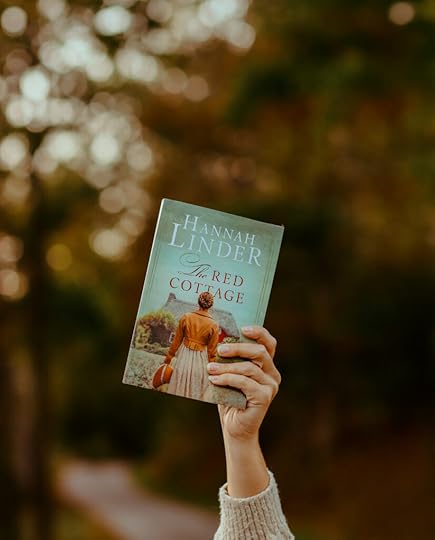

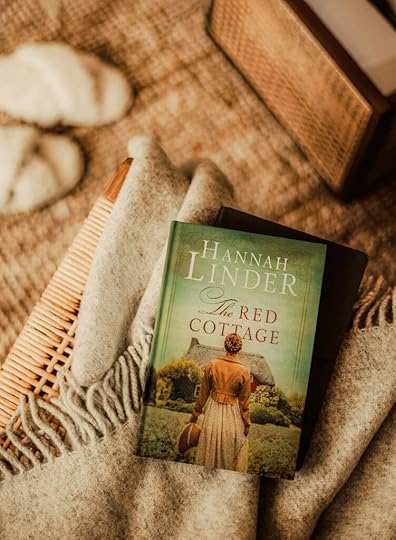


 The Red Cottage
The Red CottageMeg Foxcroft dreamed of building a red cottage—and a life—with her true love, Tom McGwen. But when her uncle’s apothecary shop goes up in flames and she awakens in the arms of an eloquent lord, Meg recalls nothing. Can Tom help her remember who she really is—and save her from an enemy who wants her dead?
The post The Red Cottage appeared first on Hannah Linder Books.
September 30, 2025
You Forgot Me
Granny forgot me.
When I was very young, we lived two hours away from her grand and lovely Victorian-style house, on the top of a pleasant neighborhood hill. Sometimes, because I would cry when a visit was over, she would send me home with one of her sweaters.
Taking it with me during a nap—and smelling Granny in the soft fabric—made me miss her less. I loved her sweaters. I loved staying the night at her house, and crawling into her bed early in the morning, so I could brush her golden hair while she told me childhood stories. I loved following her out into the backyard, where the flower beds fumed a floral smell, and watching her fill up the galvanized wash tub with the watering hose. She’d plop me into the cold water, hand me a yellow rubber duck, and let me splash and play in the summer heat.
The older I became—and the less enormously her sweaters fit my frame—the deeper our bond grew. In that creaking two-story house, we’d go upstairs, find an old box of antique trinkets, and sort through them together. Sometimes, she’d smile and tell me what it felt like, the first time Granddaddy kissed her on the back porch. How handsome he was. How wildly she felt pulled toward him.
I told her things, too.
I’d cry to her sometimes, when I was sad. Or go on a hunt with her, looking for whatever object she’d recently misplaced. Or kiss her cheek, when it was time to go back home.
We had memories together. My whole life was filled with pieces of her.
And then she forgot me.
It happened so slowly, in the beginning, that it wasn’t painful. First, it was just my name, but that wasn’t terrible, because she still had that warm, familiar expression when she looked at me. I realized some of the memories were obscure. They were no longer painted vividly in her mind, like they were in mine.
But she knew me, and that was all that mattered.
Until that changed too.
How very sad the house became, how very old and dim, when I walked through the door and she no longer smiled at me. The sensation was so wretched. Looking at her, grasping her soft hand, squeezing—but knowing it didn’t bring her comfort, because I was a stranger.
I wanted to rip the memories out of my heart and put them back into hers. I wanted her to remember she loved me. That we used to talk and laugh and work side by side in the flower beds. That I still wore her sweaters. That I still loved the smell of her. That I needed her.
Now, she’s gone. In heaven, I imagine Jesus put all those lost memories back into her soul, where she treasures them as much as I do. That’s a comfort. And even though the experience hurt, every pain has a way of blooming into something sweet and trickling its way into one of my novels.
This pain?
Well, you’ll find it tucked away inside my new release, The Red Cottage. Where Tom loves Meg, and Meg loves Tom—but she loses their memories. When you read this story, I hope you feel the angst of loving someone who has forgotten you, and the beauty in fighting for that person anyway.
Like Tom, may God grant us all the perseverance to love immeasurably and persistently.
Even if the other person is no longer able to love us back.



The post You Forgot Me appeared first on Hannah Linder Books.
July 5, 2025
It’s Quiet Here
It’s so quiet here. I think I’m used to the silence. I forget that in other places, other worlds, the sound of traffic and ambulances and machines and beeping horns become normal static.
Something everyone takes in, but all unconsciously. White noise, you know?
But here?
I’m nowhere. The mountains close in the fields, and the trees close in the creek, and the houses squat somewhere between them, dusty and proud. All the acreage has names. So-and-so’s farm. We sit on our porches and wave at each other. Tractors rumble by. The neighbor’s rooster crows every morning. One of the nearby cows bawls his unhappiness, most afternoons.
Somewhere between the crickets chirping in the evening and the barn swallows warbling in the day, that silence finds me. It swirls inside the windows of my old farmhouse. Then plays mutely along my walls. Then climbs inside me, into my head—then deeper, into my soul.
And it stirs there, like a breeze, soft and coaxing.
Until all the dust of the day—my experiences, my thoughts, my interactions—start to float upward. They drift all the way to my whispering lips to my fingers, and there they glide free.
The silence turns into words.
Then paper.
Then books.
Maybe I could write in other places. Maybe I could write in noisy rooms, in busy cities, and find ways to block out—or cease to acknowledge—the static.
But forgive me, if I tend to linger in the meadows and the countryside.
I love the silence best.
The post It’s Quiet Here appeared first on Hannah Linder Books.
November 25, 2024
Inside the Mind of the Male Character

 Inside the Mind of the Male Character
Inside the Mind of the Male CharacterA Guest Post by Author Brian McBride
The week that I set out to write this blog post, I went bowling with my family for my brother’s birthday. It’s easily been ten years since I’ve visited a bowling alley, and I quickly realized that they are not the family they once were. The introverts that we are, we were excited when we first walked into the bowling alley and saw lanes 1-40 completely empty. Surely, the staff would pick one at random. But as the staff member led us past all the empty lanes to the very last lane—number 50—our hopes were dashed. To make matters worse, our neighbors to the immediate left were a pair of forty-something, single guys who appeared they were already two drinks into their game.
Fortunately, my family can have fun in any situation. Including but not limited to being surrounded by some of the filthiest mouths I’ve been around in a long time. Still, we played our game and had a blast, doing our best to tune out the crass jokes and the drunken brawling over the course of the next two hours. As the night wore on, however, my irritation with these two men turned to pity and even sadness. Did they have wives or girlfriends waiting for them to come home? Did they have children who looked to them to lead the way? What were their childhoods like? Did they have fathers who modeled positive masculinity, or where they neglected or even abused? As someone who grew up with several positive examples of Godly manhood, it was glaringly obvious to me that there was something missing in their lives—and they’re not the only ones. Truthfully, there is a great absence of positive masculinity in contemporary culture.
When I shared this story with a friend the next day, I made the statement: “We need men again.” I believe the same could be said of fiction. As an author, my mission statement—and you’ll find it in my books and on my website—is that “there is power in story.” It cannot be overstated how important it is for fiction to depict positive role models for both men and women, and the power that these role models can have in our lives when we read their stories.
Yes, we need men in our culture who haven’t become the stereotypes they’ve been fed. Due to a crisis of fatherlessness and the absence of positive male role models, men have been treated and portrayed as dumb and brainless, obsessed with sex, physical strength their defining characteristic, and emotionally stunted. That’s why I firmly believe it is so important to evaluate how we write the men in our stories. Because when we are given positive male characters, they are so often unrealistic to the point of being unrelatable and, for the average male reader, unattainable.
In a profession that is dominated by female artists, the examples we have of male literary heroes in modern, popular fiction are unrealistic at best and problematic at worst. This is for the simple reason that the way women see things and the way men see things are often very different, and so when we write characters of the opposite gender, it’s important that we understand what makes men and women psychologically distinct and beautifully unique. More on that later.
Now, as a man, I’m not going to pretend to be any sort of expert at writing female characters. I do my best, learning from the stories I read—since they are mostly written by women—and learning from the women in my life. But what I can do is provide insight into how you, as writers, can craft male characters who resonate with the male members of your audience. To get inside the mind of a male character, we first need to understand the attributes that are inherent to men and how these attributes are either promoted or prevented.
 INHERENT TRAITS
INHERENT TRAITSTo be clear, no man’s mind works the same. Life experiences will absolutely influence the psychology of a male character and who they become, which we’ll get to in a moment. But let’s highlight some inherent male attributes:
AssertiveIndependentSelf-reliantRisk-takingCompetitiveFocused on achievementLeadership tendenciesStoicPrefers direct communicationIt’s important to understand that, while these are common and identifiable traits inherent to men, and thus male characters, there is room for nuance. Not all men exhibit all of these traits to the same degree, and there are women who, of course, exhibit some of these traits to some degree. But this is a fantastic starting point for us as authors when crafting male characters; we can look at these traits and ask, “How will my character’s journey in this story either promoteor prevent these inherent traits?”
EXTERNAL INFLUENCESA male character who has been belittled and abused isn’t likely to be assertive. A male character who is disabled isn’t likely independent and self-reliant. A male character who constantly loses to his betters isn’t likely to be competitive. A male character who is raised by women with little-to-no positive male influence isn’t likely to be stoic and is more inclined toward emotional expression.
When we first understand the foundational attributes of the male character’s mind, we can begin to craft backstories and character arcs that produce change in this character’s life in spectacular ways. Much of storytelling is about how outside forces affect our hero’s journey, and when we understand where our hero begins and the external influences that brought him to that point, we can more realistically bring him to a satisfying end.
A male character who begins as competitive and proud, assertive and stubborn, stoic and emotionally distant, independent and selfish, may by the end of your story become humble, gentle, empathetic, and selfless. Not at the cost of realistic masculinity—not by removing what makes him a man and replacing his inherent attributes with inherently feminine attributes—but by framing his newfound character traits in a way that honors what makes him a man.
THE DANGER OF THE IDEAL MANBecause storytelling is all about nuance and about pitting characters who are total opposites against one another, and even about emphasizing good versus evil, we often find two kinds of male archetypes: the Flawed Man and the Ideal Man. An example of this can be found in Tolkien’s works. Through Aragorn, we find the Ideal Man and through Boromir we find the Flawed Man. Neither of these archetypes is wrong and they can, in fact, be powerful in their way. What we’ve seen in modern, traditional storytelling, however, has been a further polarization of these two archetypes, flinging them into absurd unrelatability and unattainability.
The world of traditional publishing is dominated by romance stories like Outlander, Bridgerton, Fifty Shades of Gray, and the entire catalogues of Danielle Steele and Colleen Hoover, but none of these contain truly realistic depictions of men. The reason being that when women write men—often in romance—they tend to write the Ideal Man. A daydream. A fantasy. Sometimes this is deliberate for the sake of the story, but other times this is subconscious—particularly in escapist genres like fantasy where, as writers, we are attempting to craft new worlds and systems that feel beautiful and grand and ideal. We want heroes and we want villains, but the truth is that most male characters will fall somewhere in between; when we choose to lean into that in-between—the fact that a man in his inherent self-reliance can be both capably strong and unwittingly selfish all at the same time—we find opportunity for powerful storytelling.
The easiest way to make your male character fall flat is to fling him too far into one of these polar-opposite archetypes: Flawed or Ideal. If a male character is to be either Flawed or Ideal, he must be written in such a way that is rooted in his inherent traits as a man. (A caveat: a character’s maleness is not always central to the story, and that is okay. Sauron is a male character, but his maleness was not essential to the story. Tolkien was not concerned with whether Sauron was depicted as a “realistic male character” but rather with making Sauron evil. If written differently, Sauron could have easily been made a female. Tolkien’s choices make sense for his story, but in stories, like romance, where characters’ femininity and masculinity are central to the storyline, it is important to evaluate how they are depicted.)
The danger with the Ideal Man, in any story where his role as a man is central, is that he perpetuates stereotypes that may cause harm to the average male reader or set unrealistic expectations for the average female reader. The Ideal Man is strong and never weak. He has a flawless, cover-worthy physique. He waxes poetic on a whim. If he has flaws, they are shallow and surface-level. (e.g. He is aloof for no reason). He is overly confident and never second-guesses himself.
The bottom line is this: if we are to create a realistic male character, we must close the gap between the Flawed Man and the Ideal Man. Somewhere in between is a male character we can relate to.
THROUGH RESISTANCENow, I understand that most of you reading this are likely coming from a Christian point-of-view and so you’re not writing the “smut” that dominates mainstream fiction, and that’s great! But maybe you’d be surprised to see how some of these Ideal Man characteristics have maneuvered their way into your own writing. Perhaps as Christians, we are even more prone to this. Generally speaking, young Christian women who aren’t married spend a good deal of time praying for and dreaming of their future spouse, and perhaps they have formed an ideal of what a future husband should be. That ideal isn’t necessarily wrong, but—and we all must do this when pursuing romantic relationships—perhaps it is unrealistic to the point of being unattainable.
Should women seek a man who prays, and should men be men who pray? Absolutely. Should women seek a man who works hard, and should men strive to be hard workers? Absolutely. But this is something that we, in real life, grow toward and strive toward—it is not something that happens by default. It is either promoted or prevented. So, in fiction, when we see male characters who are depicted as the Ideal without being allowed to understand how these traits werepromoted and what they had to overcome to become this person, it comes off as unrealistic and unattainable, and this can actually be harmful to the male psyche by leading them to believe that, since they are so deeply flawed, they are undesirable, unwanted, unseen, and worthless.


Believe it or not, a male character who is flawed and fails will resonate more with male readers than the Ideal Man. Why? Because many men often feel deeply flawed in some way or another. This doesn’t mean we swing so far to the other end of the spectrum as to depict only men who are deeply flawed, however. I believe Frodo Baggins from The Lord of the Rings provides a good example of this. Throughout his journey to destroy the One Ring, Frodo bears the weight of the Ring and the gravity of his responsibility to see it destroyed. At times, he fails to resist the pull of the Ring, because he is only a man (well, Hobbit). But in Frodo, we see that because he has personally carried the Ring’s weight, he understands all the more the urgent need to see it destroyed. And so, as the films go on, the Ring tries less and less to seduce Frodo to wield its power while continuing to try to seduce those around Frodo. Frodo is, at once, an example of a man’s fragile strength juxtaposed with his sheer determination and force of will. Truly, only Frodo could have destroyed the One Ring.
So, how do we write realistic male characters? We don’t want to oversell their strengths, but we also don’t want to make them unlikably weak. That brings us back to understanding what makes men and women psychologically unique and distinct from one another. When you read that, you probably made a few assumptions—like “women are emotional creatures” or “men are visual creatures” and maybe you have biases based upon poor experiences in the past. While these stereotypes may carry some truth to them, it’s actually a lot more nuanced than that. When we fail to recognize and work within the nuances of male stereotypes—that place that exists between the Flawed Man and the Ideal Man—the result is an unrelatable, unrealistic male character.
An article published to the National Library of Medicine, entitled “Understanding Female and Male Insights in Psychology: Who Thinks What?” it says this: “A male becomes wise and mature through resistance and good guidance, whereas a female becomes matured and wise through least resistance and good guidance.”
As writers, our primary goal when crafting any character is their development. Whether it is a hero arc or a villain arc or somewhere in between, the character we end up with in the finale should always differ vastly from the character we began with in the opening scenes. But the inner journey a male character takes needs to differ from the inner journey a female character takes. A male character will grow and mature through resistance while a female character will grow and mature through least resistance.
Storytelling is about our characters and how they respond to resistance. It’s about hurdles and obstacles, plot twists and road-blocks. Understanding the difference in how a male character will naturally respond to these things versus a female character is pivotal to writing realistic male characters. This doesn’t mean female characters don’t face resistance, but it does mean they will respond to it from a different place in their inner life.
I won’t pretend to have the perfect understanding of how to write realistic male/female characters, but my hope is that, if nothing else, everything I’ve written here has provided plenty of food for thought. Honestly, these lessons aren’t just vital to good storytelling, but to healthy communication in general. When we, as men and women, learn to better understand one another, we can better communicate with one another. The same goes for the stories we tell and the way we tell them.
 About Brian
About BrianBorn and raised in the misty mountains of Oregon before moving to the San Francisco Bay Area, Brian has been writing since he was old enough to hold a pen and has been reading for even longer. A professional multi-tasker, Brian has built a Tiny House on Wheels, started a small business, launched his own publishing imprint, and serves on staff at his church. His growing list of interests include but are not limited to: his goofy German Shepherd, Arlo, iced tea, tropical getaways, and angsty teen dramas.
Instagram: @brianmcbrideauthor
Facebook: /brianmcbrideauthor
TikTok: @brianmcbrideauthor
The post Inside the Mind of the Male Character appeared first on Hannah Linder Books.
November 1, 2024
Release Day!
We seldom know anyone. I mean, really know them. We brush hands with people, laugh with them, tell them our stories, listen to theirs, and think we know them.
But we don’t.
We have no idea what thrums in their heart, late at night, when they burrow their face into a wet pillow. We have no idea what they fear. We have no idea what beautiful thoughts dance in their mind, or what ugly mysteries harden like lava in the pit of their chest.
“We all have secrets,” Georgina Whitmore, our heroine in Never Forgotten, once said to Mr. Simon Fancourt. He didn’t understand. He didn’t even suspect.
Because he’d sat beside her a hundred times.
Played whist with her.
Rode alongside her in summer carriage rides.
Smiled at her—emptily—and cringed a little when she smiled back.
If you had asked him, at seventeen years old, if he knew Georgina Whitmore, he would have been earnest in his answer. “Yes.” Lovely. Soft. Teasing. Ridiculous. Shallow. All attributes he professed to know only by their brief, passionless courtship.
She was more than he had ever noticed.
Deeper than he had imagined.
Perhaps if he had looked longer, prodded harder, he might have seen a glimpse of what dwelled in the heart of the woman he was betrothed to marry. How long is too long? How many years may blindness, ignorance, and prejudice be forgiven? Even if Simon finally discovers the loveliness of her heart, will it be too late?
If you walk away from Never Forgotten with nothing else, I hope you feel challenged to look deeper. As you’re brushing hands, laughing, telling stories—I hope you stare into people’s eyes and search for a bit of their soul.
We’re all more than what we seem.
We all have secrets.
Like Simon, you may discover the people around you are more beloved, dear, and wonderful than you ever imagined.

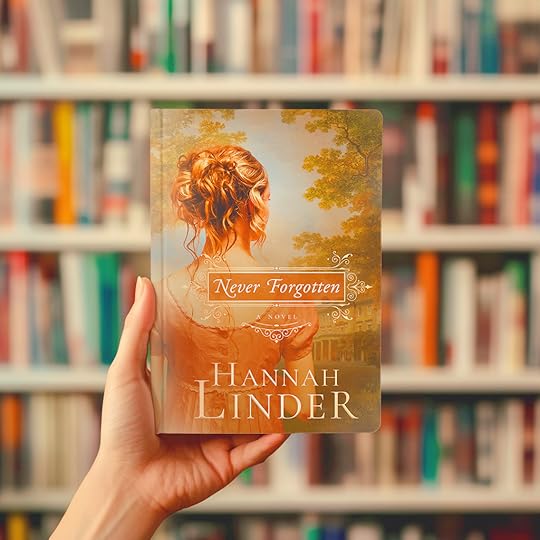







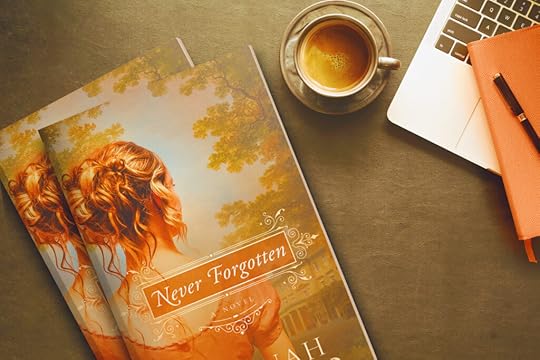 About the Book
About the Book All He Wanted was Justice. All She Wanted was His Heart.
Georgina Whitmore, not accustomed to any man being unaffected by her charms, is plagued with the disappearance and rejection of Simon Fancourt. Twelve years later, Mr. Fancourt returns to British society with two children and a mad hunger for justice.
Racing against time, Simon works to uncover the men responsible for his wife’s horrific murder, protect his children, and fulfill his father’s unexpected will by marrying Georgina—the last thing in the world he wants to do.
Though her heart throbs to accept, she would rather lose him again than have his name without his love. She denies his proposal of matrimony, knowing it will cost them both. But as tragedies unravel and secret enemies narrow their sights on Simon, Georgina risks her life—and her reputation—to protect him and the children. Will the danger scorch them alive? Or will it, for the first time, open his heart to her?
The post Release Day! appeared first on Hannah Linder Books.
September 19, 2024
Romanticizing Autumn
Fall is such a fleeting time of year. Like blustering winds, it sweeps us away from summer, dazzles us with breathtaking colors, and chills the mornings just slowly enough that we accept the change painlessly.
Well, almost painlessly.
It still hurts, like saying goodbye to an old friend, to let summer go. I know I’ll miss sunshine warming my cheeks. Or fresh air, carrying the song of night bugs, through my bedroom window. Or green hills and rippling warm lakes or dripping popsicles on the front porch steps.
But like all good things, summer too must take its final bow and flit from the stage, promising to come back again soon. In the meantime, I must devote myself full-heartedly (well, okay, half-heartedly) to the charming vibes of autumn.
What are ways you celebrate the season? Any tips on “romanticizing” fall?


FAVORITE FALL DRINKS:
A Hot Caramel Macchiato (sorry, not a fan of pumpkin) Warm Green TeaWhite Hot Chocolate A Salted Carmel Cold BrewFAVORITE FALL MUSIC:
’Tis Autumn by Nat King Cole Harvest Moon by Sierra Ferrel Blue Over You by Mason RamseyFAVORITE FALL ACTIVITIES:
Reading under a cozy blanketDrinking warm cider on a country hayride Square dancing late into the eveningTaking walks down a colorful dirt roadListening to old records on my victrolaWhat would be on your “fall favorites” list, friend?

The post Romanticizing Autumn appeared first on Hannah Linder Books.
July 8, 2024
Summer + Books
How has your summer been so far?

Mine has been lovely, warm, and something like a movie. I float in and out of days with my heart tangled in everything. Crunching away at popsicles on the front porch. Jamming old-time music with friends and family. Soaking up the sun. Dancing partway into the night. Teaching the new puppy how to shake. Laughing when he doesn’t. Taking walks. Picnics. Going to the waterfall by myself and asking all the questions I don’t have answers for.
I wish I could keep the season forever. What about you? If you could circle back into summer, over and over, without it ever getting cold, would you?
THINGS I’VE DONE SO FAR THIS SUMMER:
MUSIC I’VE BEEN LISTENING TO ON REPEAT:
Gentle on My Mind by the Petersens All My Loving by the Beatles Hazel Eyes by Sabrina JordanRECENT BOOKS I’VE READ:
When Hope Sank by Denise WeimerDriving Force by Lynette Eason and Kate AngeloNo Match for Love by Karen ThornellProtecting the Mountain Man’s Treasure by Misty M. BellerWhat have you done, listened to, and read this summer?
 book
bookSPOTLIGHTbuy here
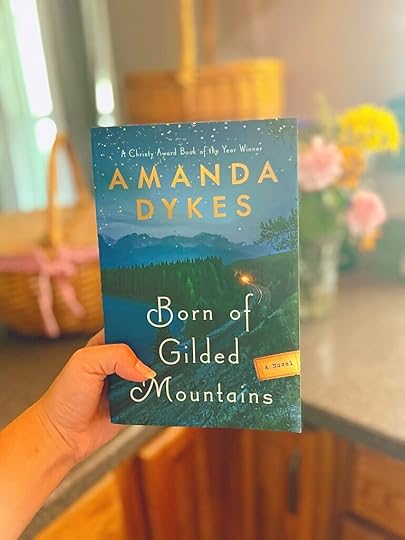
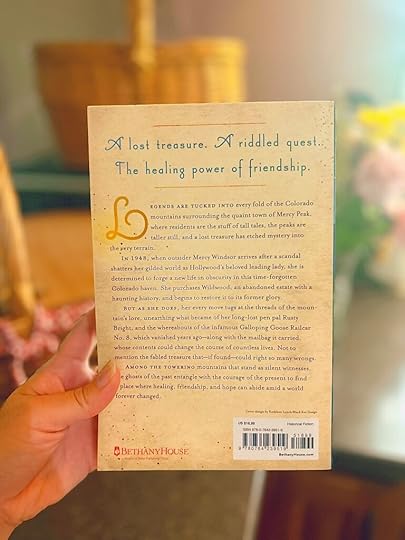
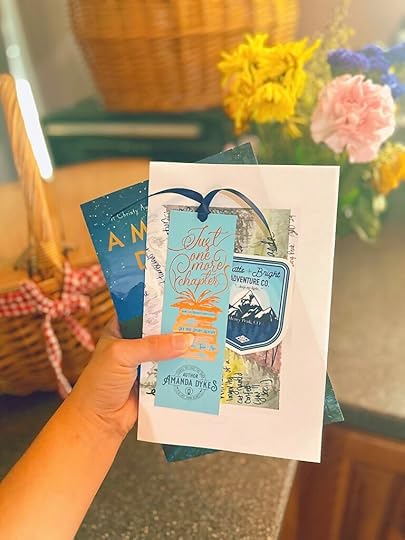 Have you read any of Amanda Dykes’ books?
Have you read any of Amanda Dykes’ books? Which of her book covers are your favorite so far (although, I admit—that question is a little unfair when they’re all so breath-stealing).
Check out her new release. Here’s a bit about the book:
A lost treasure. A riddled quest. The healing power of friendship.
Legends are tucked into every fold of the Colorado mountains surrounding the quaint town of Mercy Peak, where residents are the stuff of tall tales, the peaks are taller still, and a lost treasure has etched mystery into the very terrain.
In 1948, when outsider Mercy Windsor arrives after a scandal shatters her gilded world as Hollywood’s beloved leading lady, she is determined to forge a new life in obscurity in this time-forgotten Colorado haven. She purchases Wildwood, an abandoned estate with a haunting history, and begins to restore it to its former glory.
But as she does, her every move tugs at the threads of the mountain’s lore, unearthing what became of her long-lost pen pal Rusty Bright, and the whereabouts of the infamous Galloping Goose Railcar No. 8, which vanished years ago—along with the mailbag it carried, whose contents could change the course of countless lives. Not to mention the fabled treasure that—if found—could right so many wrongs.
Among the towering mountains that stand as silent witnesses, the ghosts of the past entangle with the courage of the present to find a place where healing, friendship, and hope can abide amid a world forever changed.
The post Summer + Books appeared first on Hannah Linder Books.
May 6, 2024
“The Long March Home” Book Review
I sum up THE LONG MARCH HOME with two words: significant and real. From chapter one, I took passage through the pages of the book into a gripping World War II setting, where I was allowed to feel, smell, and touch history in an unforgettable way.
Brotherton and Lee accomplish the perfect juxtaposition of lulling home life and wartime horrors, swaying us back and forth between past and present—while still managing to surprise us in the end. I loved Hank. I loved Jimmy. I loved Claire. More importantly, I loved the portrayal of human love in this book. Not exaggerated or flawless—but the gritty reality of love that makes mistakes, takes the wrong turn, argues, forgives, sacrifices, and in the end starts over.
THE LONG MARCH HOME belongs on a shelf with the classics. Truly a masterpiece.
CW: mild profanity, violence, minimal sexual content.
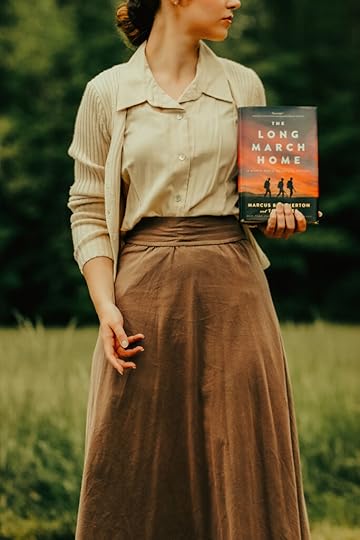
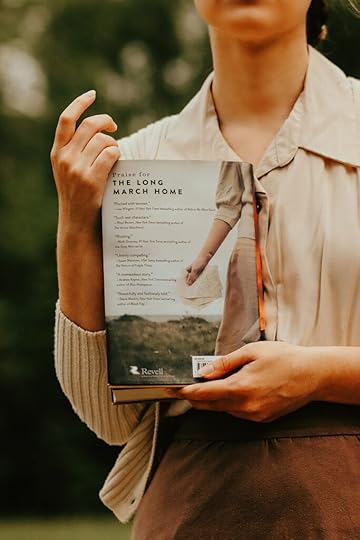

The post “The Long March Home” Book Review appeared first on Hannah Linder Books.
May 1, 2024
Release Day!

It’s always a strange feeling. Reaching inside of yourself, deeper than anyone sees, where your thoughts simmer and your longings pulse. Fingering through them, like sorting messes. Dragging them from the dimness of your soul to the light of paper, twisting them into stories, then closing them all in a book and handing them away.
Part of me is tucked inside everything. Pieces of all my experiences and dreams and groggy thoughts before I fall asleep each night.
I hope THE GIRL FROM THE HIDDEN FOREST sweeps you away into a haunting land. I hope you live and breathe the story, as I did. I hope the pieces of me—and the pieces of the characters—resonate with the pieces of you.
Happy reading, everyone! Hope you enjoy! You can purchase here.
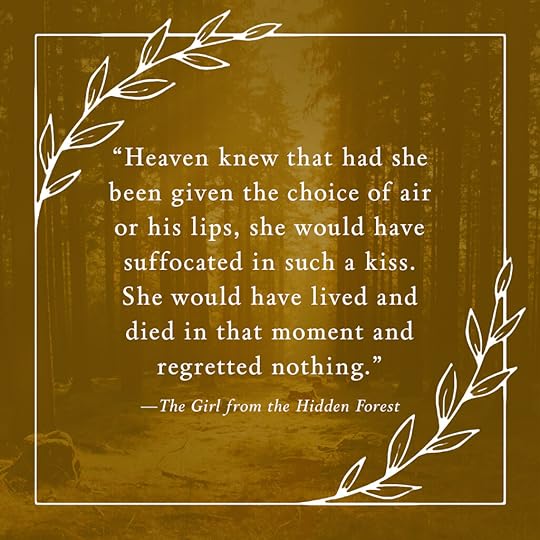

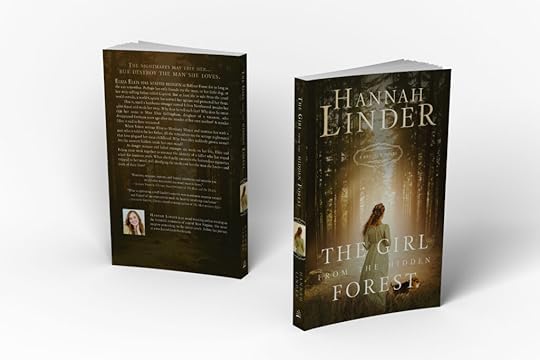



The post Release Day! appeared first on Hannah Linder Books.
October 2, 2023
Release Day!
Sometimes, the things we say we’ll never do are exactly the things we find ourselves doing.
Back when I was still wearing two braids and walking around barefoot everywhere, I told myself I would never make a speech. Never. But by the time high school graduation came along, despite a thousand firm declarations that I wouldn’t, my mother shook her head. “I think you should do it,” she said—and because mothers are usually right, I did.
Granted, I read the speech off a folded sheet of copy paper because I was too nervous to face the crowd. And my knees were jelly. And I stood off-centered on the stage instead of behind the pulpit like anyone else.
But I did it.
For the rest of my life, I’ll look back and remember what it felt like. Standing on the stage, reading my heart, hearing the sniffles and glancing up to see tears glistening in the eyes of endless people I love.
That was special. Mother was right.


Want to know another thing I said I would never do? Re-write a novel. I’ve heard the stories all my life. The author second guesses their own ability and burns their manuscript. Then, years later, they rewrite the story that echoes through the ages as a classic. Or the novelist loses their entire document to a computer crash, so with a blank page and a blinking cursor, they start anew.
I never thought that was something I could do.
I never wanted to.
If I ever lost a novel or was prompted to start over, I would abandon ship and try for a different vessel. Anyway, that’s what I told myself.
Garden of the Midnights was the story I wrote many years ago when I was younger, when I knew less about manors and England and history. I made mistakes. I broke writing rules. I did too little research and too much overwriting…but it had my soul. Somehow, it was alive. The characters breathed. The tears in their pillow, the aches in their throat, became a part of who I was and what I felt.
This was the story I loved most.
But the edits and the mistakes and the problems overwhelmed me. Like the fearful girl in braids who refused to make a speech, I wanted to throw in the towel and say with even more defiance, “I will never re-write a novel. Never.”
But Mother knew what was needed. She knew the story was too much a part of me to tuck away in some drawer, forgotten and dusty, unread by anyone. So she nodded her head and said, “I think you should do it.”
I didn’t want to.
I was afraid because it wasn’t easy.
But because mothers are usually right, I did. Now, Garden of the Midnights is ready. My heart is still tangled in all the words, all the twists, all the secrets—but this time more, because the book has yet another part of me. The part that was fearful. The part that was too close to quitting. The part that finished anyway.
For the rest of my life, I’ll look back and be thankful. When someone writes me a note that they enjoyed the book, or gets a whimsical tone to their voice when they talk about a scene, or looks up from the pages with tears shimmering in their eyes.
That will be special. Mother was right.
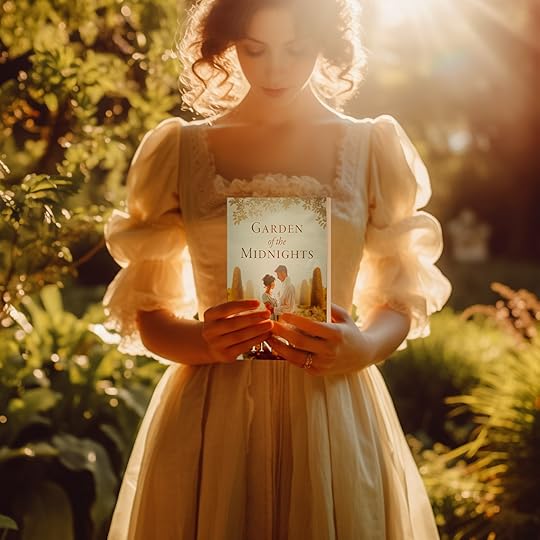



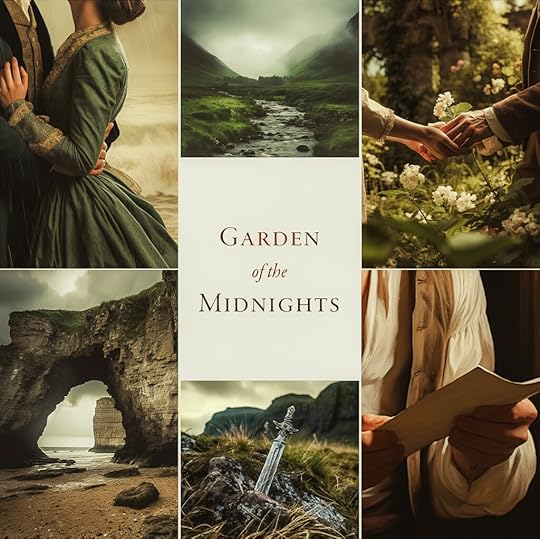
 Purchase on Amazon
Purchase on AmazonThe post Release Day! appeared first on Hannah Linder Books.



